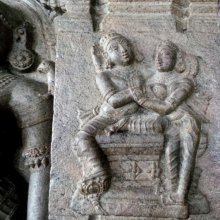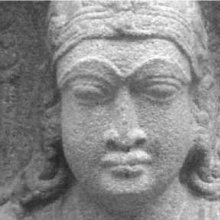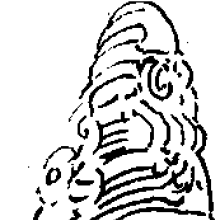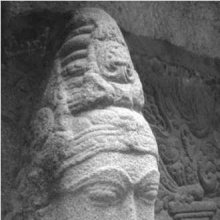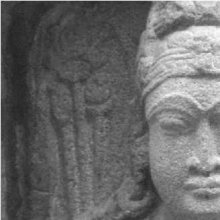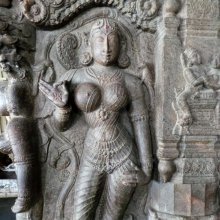Manmatha, Manmathā, Mānmatha: 24 definitions
Introduction:
Manmatha means something in Hinduism, Sanskrit, Jainism, Prakrit, Marathi, Hindi, biology. If you want to know the exact meaning, history, etymology or English translation of this term then check out the descriptions on this page. Add your comment or reference to a book if you want to contribute to this summary article.
Alternative spellings of this word include Manmath.
Images (photo gallery)
(+1 more images available)
In Hinduism
Purana and Itihasa (epic history)
Source: archive.org: Shiva Purana - English TranslationManmatha (मन्मथ) is the one of the names of Kāma, according to the Śivapurāṇa 2.2.3.—“[...] The Brahmins Marīci and others, my sons, decided on suitable names for the Being and said thus”. The sages said:—“Since at your nativity itself you have begun to torment and bedevil our minds and that of Brahmā too, you will be famous in the world as Manmatha”.
Source: Cologne Digital Sanskrit Dictionaries: The Purana Index1) Manmatha (मन्मथ).—(Kāma); God of Love;1 on the third Parva of the Geyacakra;2 recreated by Lalitā, who said he was her son; went to Śiva's abode accompanied by his friend Vasanta.3 Got burnt by Śiva and in effecting his revival Māyavatī (Ratī) deluded Śambara by her charms; she brought up Pradyumna who was a part of the Love God.4
2) Manmathā (मन्मथा).—A goddess enshrined at Hemakūṭa.*
- * Matsya-purāṇa 13. 50.

The Purana (पुराण, purāṇas) refers to Sanskrit literature preserving ancient India’s vast cultural history, including historical legends, religious ceremonies, various arts and sciences. The eighteen mahapuranas total over 400,000 shlokas (metrical couplets) and date to at least several centuries BCE.
Vastushastra (architecture)
Source: Shodhganga: Temples of Salem region Up to 1336 ADManmatha (मन्मथ).—Sculptures of Manmatha and Rati are found at many temples in the region. They are the representations of love and sexual pleasure. Their grace is supposed to be necessary for the fulfillment of the third Puruṣārtha of a man i.e. Kāma, according to the Hindu tradition. Therefore, for gaining satkāma (love and lust in the right path) they are worshipped.
The sculptures of this couple are found in many temples, especially in the Śaiva temples. Texts prescribe that the sculptures of Manamtha and Rati should be carved with great luster and ornamentation. They are shown as two-handed. Manmatha holds the bow made of sugarcane in his left hand and the arrows made of five flowers in his right. He must be shown as embracing his wife in the left hand. Rati must be depicted as a young lady with a voluptuous body. She should be decked with various ornaments. The mount of Manmatha is the parrot.

Vastushastra (वास्तुशास्त्र, vāstuśāstra) refers to the ancient Indian science (shastra) of architecture (vastu), dealing with topics such architecture, sculpture, town-building, fort building and various other constructions. Vastu also deals with the philosophy of the architectural relation with the cosmic universe.
Jyotisha (astronomy and astrology)
Source: Wisdom Library: Brihat Samhita by VarahamihiraManmatha (मन्मथ) refers to the twenty-ninth of the sixty-year cycle of Jupiter, according to the Bṛhatsaṃhitā (chapter 8), an encyclopedic Sanskrit work written by Varāhamihira mainly focusing on the science of ancient Indian astronomy astronomy (Jyotiṣa).—Accordingly, “The five years of the next yuga are—1. Nandana, 2. Vijaya, 3. Jaya, 4. Manmatha, 5. Durmukha: during the first three years there will be happiness in the land; in Manmatha mankind will feel neither happy, nor miserable and in the year Durmukha they will feel miserable”.
Source: The effect of Samvatsaras: SatvargasManmatha (मन्मथ) refers to the twenty-ninth saṃvatsara (“jovian year)” in Vedic astrology.—If there is birth in the ‘samvatsara’ of ‘manmatha’, the native is adorned with ornament of special kind, gets sensuous pleasure with woman, is sweet-spoken, always remains engaged in singing and dancing and is voluptuous (one who enjoys the pleasures of the senses).
According with Jataka Parijata, the person born in the year manmatha (2015-2016 AD) will have a craving for sensual enjoyment and will be victorious over his foes.

Jyotisha (ज्योतिष, jyotiṣa or jyotish) refers to ‘astronomy’ or “Vedic astrology” and represents the fifth of the six Vedangas (additional sciences to be studied along with the Vedas). Jyotisha concerns itself with the study and prediction of the movements of celestial bodies, in order to calculate the auspicious time for rituals and ceremonies.
Kavya (poetry)
Source: Shodhganga: Mankhaka a sanskrit literary geniusManmatha (मन्मथ) was the grandfather of Maṅkhaka (or Maṅkha or Maṅkhuka): the author of the Śrīkaṇṭhacarita and the Maṅkhakośa.

Kavya (काव्य, kavya) refers to Sanskrit poetry, a popular ancient Indian tradition of literature. There have been many Sanskrit poets over the ages, hailing from ancient India and beyond. This topic includes mahakavya, or ‘epic poetry’ and natya, or ‘dramatic poetry’.
Shaktism (Shakta philosophy)
Source: Google Books: ManthanabhairavatantramManmatha (मन्मथ) refers to “passion” or the “God of love”, according to the according to the Kularatnoddyota, one of the earliest Kubjikā Tantras.—Accordingly, as the God says to the Goddess: “[...] Once my incarnation has burnt up Manmatha (the god of love), he will abandon her and go forth. Then, overcome with passion (manmatha-āviṣṭa) and troubled by that separation, she (will) reside within the Triple Peaked mountain (immersed) in the aesthetic experience of the bliss of passion. O great goddess, she will connect (her) tongue to the Place of Power. O fair lady, (that) venerable lady, born from my limbs, even though a virgin, will bear in her womb the one who will cause the lineage of the Śrīkula to prosper. [...]”.

Shakta (शाक्त, śākta) or Shaktism (śāktism) represents a tradition of Hinduism where the Goddess (Devi) is revered and worshipped. Shakta literature includes a range of scriptures, including various Agamas and Tantras, although its roots may be traced back to the Vedas.
In Jainism
General definition (in Jainism)
Source: archive.org: Een Kritische Studie Van Svayambhūdeva’s PaümacariuManmatha (मन्मथ) participated in the war between Rāma and Rāvaṇa, on the side of the latter, as mentioned in Svayambhūdeva’s Paumacariu (Padmacarita, Paumacariya or Rāmāyaṇapurāṇa) chapter 57ff. Svayambhū or Svayambhūdeva (8th or 9th century) was a Jain householder who probably lived in Karnataka. His work recounts the popular Rāma story as known from the older work Rāmāyaṇa (written by Vālmīki). Various chapters [mentioning Manmatha] are dedicated to the humongous battle whose armies (known as akṣauhiṇīs) consisted of millions of soldiers, horses and elephants, etc.
Source: archive.org: TrisastisalakapurusacaritraManmatha (मन्मथ) refers to one of the warriors fighting in Rāma’s army, according to the Jain Ramayana and chapter 7.7 [The killing of Rāvaṇa] of Hemacandra’s 11th century Triṣaṣṭiśalākāpuruṣacaritra: an ancient Sanskrit epic poem narrating the history and legends of sixty-three illustrious persons in Jainism.—Accordingly, “[...] When the battle had been going on for a long time, the army of the Rākṣasas was broken by the Vānaras like a forest by winds. [...] Then Sugrīva and the others made seven walls with four gates around the two Rāghavas by means of a vidyā. [...] In the west Nīla, Samaraśīla, Durdhara, Manmatha, Jaya, Vijaya, and Sambhava stood. [...]. Making the two Kākutsthas in the center in this way, Sugrīva and the others, powerful, were devoted to watching, intent as yogis. [...].”.

Jainism is an Indian religion of Dharma whose doctrine revolves around harmlessness (ahimsa) towards every living being. The two major branches (Digambara and Svetambara) of Jainism stimulate self-control (or, shramana, ‘self-reliance’) and spiritual development through a path of peace for the soul to progess to the ultimate goal.
Biology (plants and animals)
Source: Google Books: CRC World Dictionary (Regional names)Manmatha in India is the name of a plant defined with Ipomoea pes-caprae in various botanical sources. This page contains potential references in Ayurveda, modern medicine, and other folk traditions or local practices It has the synonym Convolvulus pescaprae Linnaeus (among others).
Example references for further research on medicinal uses or toxicity (see latin names for full list):
· Proceedings of the Indian Science Congress Association (1984)
· Journal of Natural Products (2007)
· Primitiae Florae Essequeboensis (1818)
· Cytologia (1979)
· Guihaia (1994)
· Flora Indica (1824)
If you are looking for specific details regarding Manmatha, for example extract dosage, health benefits, diet and recipes, chemical composition, side effects, pregnancy safety, have a look at these references.

This sections includes definitions from the five kingdoms of living things: Animals, Plants, Fungi, Protists and Monera. It will include both the official binomial nomenclature (scientific names usually in Latin) as well as regional spellings and variants.
Languages of India and abroad
Marathi-English dictionary
Source: DDSA: The Molesworth Marathi and English Dictionarymanmatha (मन्मथ).—m (S Stirrer or agitater of the heart.) A name of the Hindu Cupid.
Source: DDSA: The Aryabhusan school dictionary, Marathi-Englishmanmatha (मन्मथ).—m A name of the Hindu Cupid.
Marathi is an Indo-European language having over 70 million native speakers people in (predominantly) Maharashtra India. Marathi, like many other Indo-Aryan languages, evolved from early forms of Prakrit, which itself is a subset of Sanskrit, one of the most ancient languages of the world.
Sanskrit dictionary
Source: DDSA: The practical Sanskrit-English dictionaryManmatha (मन्मथ).—
1) Cupid, the god of love; मन्मथो मां मथ्नन्निजनाम सान्वयं करोति (manmatho māṃ mathnannijanāma sānvayaṃ karoti) Daśakumāracarita 1; Meghadūta 75; न मन्मथस्त्वं स हि नास्ति- मूर्तिः (na manmathastvaṃ sa hi nāsti- mūrtiḥ) N. 8.29.
2) Love, passion; प्रबोध्यते सुप्त इवाद्य मान्मथः (prabodhyate supta ivādya mānmathaḥ) Ṛtusaṃhāra 1.8; so परोक्षमन्मथः जनः (parokṣamanmathaḥ janaḥ) Ś.2.19.
3) The wood apple.
4) Name of a संवत्सर (saṃvatsara).
-thā Name of Dākṣāyaṇī. -a. Enchanting, attractive; साक्षान्मन्मथमन्मथः (sākṣānmanmathamanmathaḥ) Bhāg. 1.32.2.
Derivable forms: manmathaḥ (मन्मथः).
--- OR ---
Mānmatha (मान्मथ).—a. (-thī f.) [मन्मथ-अण (manmatha-aṇa)] Relating to or caused by love; आचार्यकं विजयि मान्मथमाविरासीत् (ācāryakaṃ vijayi mānmathamāvirāsīt) Mālatīmādhava (Bombay) 1.16;2.4.
Source: Cologne Digital Sanskrit Dictionaries: Shabda-Sagara Sanskrit-English DictionaryManmatha (मन्मथ).—m.
(-thaḥ) 1. A name of Kama, the god of love. 2. Love, amorous passion or desire. 3. The elephant or wood-apple. E. mat the heart, math to agitate, aff. ac .
Source: Cologne Digital Sanskrit Dictionaries: Benfey Sanskrit-English DictionaryManmatha (मन्मथ).— ([frequentative.] of manth + a), m. 1. A name of the god of love, [Pañcatantra] 216, 17. 2. Love, [Ṛtusaṃhāra] 1, 27. 3. The elephant or wood-apple.
--- OR ---
Mānmatha (मान्मथ).—. i. e. manmatha + a, adj. Caused by love, [Prabodhacandrodaya, (ed. Brockhaus.)] 41, 4.
Source: Cologne Digital Sanskrit Dictionaries: Cappeller Sanskrit-English DictionaryManmatha (मन्मथ).—[masculine] love or the god of love (lit. the shaker or agitator).
--- OR ---
Mānmatha (मान्मथ).—[feminine] ī relating to love or the god of love.
Source: Cologne Digital Sanskrit Dictionaries: Aufrecht Catalogus Catalogorum1) Manmatha (मन्मथ) as mentioned in Aufrecht’s Catalogus Catalogorum:—father of Kṣemaśarman (Kṣemakutūhala). W. p. 293.
2) Manmatha (मन्मथ):—father of Viśvāvarta, grandfather of Śṛṅgāra, Bhṛṅga, Alaṃkāra and Maṅkha. Śrīkaṇṭhacarita 3, 31.
Source: Cologne Digital Sanskrit Dictionaries: Monier-Williams Sanskrit-English Dictionary1) Manmatha (मन्मथ):—m. (either an [Intensive] form [from] √math, or [from] man = manas + matha, ‘agitating’; cf. mandeha and mandhātṛ) love or the god of love, amorous passion or desire (ifc. f(ā). ), [Mahābhārata; Kāvya literature] etc.
2) Feronia Elephantum, [cf. Lexicographers, esp. such as amarasiṃha, halāyudha, hemacandra, etc.]
3) the 29th (3rd) year in a 60 years' cycle of Jupiter, [Varāha-mihira’s Bṛhat-saṃhitā]
4) Name of a physician and various other men, [Catalogue(s)]
5) Manmathā (मन्मथा):—[from manmatha] f. Name of Dākṣāyaṇī, [ib.]
6) Mānmatha (मान्मथ):—mf(ī)n. ([from] manmatha) relating to or concerning love, produced by love, filled with love etc., [Kāvya literature]
7) belonging to the god of l°, [Vikramāṅkadeva-carita, by Bilhaṇa]
Source: Cologne Digital Sanskrit Dictionaries: Yates Sanskrit-English DictionaryManmatha (मन्मथ):—[ma-nmatha] (thaḥ) 1. m. Kāma; wood-apple.
Source: DDSA: Paia-sadda-mahannavo; a comprehensive Prakrit Hindi dictionary (S)Manmatha (मन्मथ) in the Sanskrit language is related to the Prakrit words: Mammaha, Vammatha, Vammaha.
[Sanskrit to German]
Sanskrit, also spelled संस्कृतम् (saṃskṛtam), is an ancient language of India commonly seen as the grandmother of the Indo-European language family (even English!). Closely allied with Prakrit and Pali, Sanskrit is more exhaustive in both grammar and terms and has the most extensive collection of literature in the world, greatly surpassing its sister-languages Greek and Latin.
Hindi dictionary
Source: DDSA: A practical Hindi-English dictionaryManmatha (मन्मथ) [Also spelled manmath]:—(nm) Cupid—the god of love.
...
Kannada-English dictionary
Source: Alar: Kannada-English corpusManmatha (ಮನ್ಮಥ):—
1) [noun] the Love-God.
2) [noun] the twenty nineth year in the Hindu cycle of sixty years.
3) [noun] a kind of tree.
Kannada is a Dravidian language (as opposed to the Indo-European language family) mainly spoken in the southwestern region of India.
See also (Relevant definitions)
Partial matches: Ma.
Starts with (+11): Manmata, Manmata-panavastai, Manmataccantu, Manmatan, Manmatavetanai, Manmatha mara, Manmatha shakthi, Manmathabaanam, Manmathabanamu, Manmathabandhu, Manmathabhumi, Manmathacakra, Manmathakara, Manmathalaya, Manmathalekha, Manmathalile, Manmathamanmatha, Manmathamath, Manmathanala, Manmathananda.
Ends with: Alimanmatha, Antarmanmatha, Jatamanmatha, Manmata, Manmathamanmatha, Parokshamanmatha, Ratimanmatha, Samanmatha, Sevitamanmatha, Vigadhamanmatha.
Full-text (+238): Manmathin, Manmathananda, Kandarpa, Manmathavishta, Manmathamanmatha, Manmathasuhrid, Manmathavat, Manmathasamana, Manmataccantu, Manmathalekha, Manmata-panavastai, Manmathamath, Kusumabana, Manmathayuddha, Manmathakara, Manmathabandhu, Ratimanmathapuja, Panceshu, Manmathasakha, Manmatha mara.
Relevant text
Search found 47 books and stories containing Manmatha, Ma-nmatha, Manmathā, Mānmatha; (plurals include: Manmathas, nmathas, Manmathās, Mānmathas). You can also click to the full overview containing English textual excerpts. Below are direct links for the most relevant articles:
Bhajana-Rahasya (by Srila Bhaktivinoda Thakura Mahasaya)
Text 17 < [Chapter 7 - Saptama-yāma-sādhana (Pradoṣa-kālīya-bhajana–vipralambha-prema)]
Text 16 < [Chapter 7 - Saptama-yāma-sādhana (Pradoṣa-kālīya-bhajana–vipralambha-prema)]
Garga Samhita (English) (by Danavir Goswami)
Verse 1.16.18 < [Chapter 16 - Description of Śrī Rādhikā’s Wedding]
Verse 5.5.7 < [Chapter 5 - Śrī Kṛṣṇa’s Entrance Into Mathurā]
Verse 4.13.10 < [Chapter 13 - The Story of the Demigoddesses]
Tiruvaymoli (Thiruvaimozhi): English translation (by S. Satyamurthi Ayyangar)
Pasuram 2.7.8 < [Section 7 - Seventh Tiruvaymoli (kecavan tamar)]
Nitiprakasika (Critical Analysis) (by S. Anusha)
The Padma Purana (by N.A. Deshpande)
One hundred and eight (108) names of Sāvitrī < [Section 1 - Sṛṣṭi-khaṇḍa (section on creation)]
Chapter 84 - The Damanaka Festival < [Section 6 - Uttara-Khaṇḍa (Concluding Section)]
Chapter 133 - The Holy Places in Jambūdvipa < [Section 6 - Uttara-Khaṇḍa (Concluding Section)]
Sahitya-kaumudi by Baladeva Vidyabhushana (by Gaurapada Dāsa)
Text 7.83 < [Chapter 7 - Literary Faults]
Text 10.163 < [Chapter 10 - Ornaments of Meaning]
Related products
